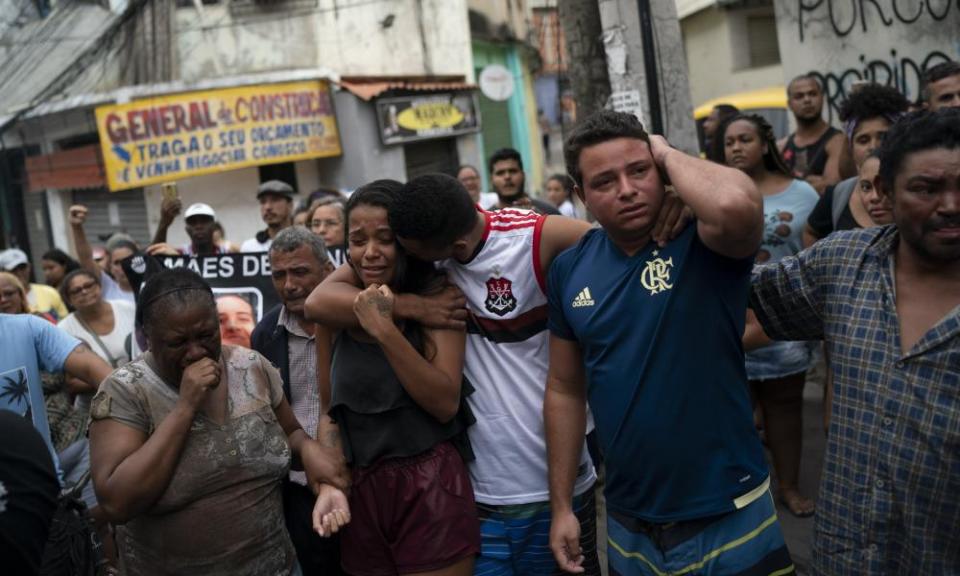Brazilians blame Rio governor's shoot-to-kill policy for death of girl, 8

The photo shows a smiling eight-year-old girl dressed as Wonder Woman, beaming through gap teeth and crossing her small clenched fists into an X. Shocked Brazilians shared the image of Ágatha Félix online after she was shot in the back in a Rio de Janeiro favela on Friday night by what residents said was a bullet from a police officer’s rifle. She later died in hospital.
She was the fifth young child to be killed in Rio favelas this year. Favela activists, politicians, the public defenders’ office and the president of Rio’s bar association blamed the shoot-to-kill policy of the Rio governor, Wilson Witzel. “He is responsible for the murder,” tweeted Guilherme Boulos, a leftist politician.
An ally of the far-right president, Jair Bolsonaro, Witzel was elected last year after promising a “slaughter” of drug gangsters. On Saturday, as hundreds demonstrated in anger in the Complexo do Alemão favela where Ágatha was shot, the hashtag #aculpaedowitzel (it’s Witzel’s fault) led trending topics in Brazil. Others shared cartoons showing the smiling governor wiping blood from his face. Another protest was scheduled on Sunday before her burial.
#SayHerName #aculpaédowitzel mataram uma pequena heroína.
ceifaram um futuro.
Aniquilaram uma família
Quando uma criança negra é assassinada morrem com ela dezenas de pessoas. Como disse @raullsantiago quem não morrer pela bala morre pela consequência do resultado dela https://t.co/Xb7I20sLlp— Eu conecto pessoas através de livros. (@winniebueno) September 21, 2019
“This is the death of a child whose only sin in her life was being poor. Why is the state security policy an extermination policy?” Luciano Bandeira, the president of Rio’s bar association, told the O Globo newspaper. “There is no remorse, no admission of fault, no will to rethink the policy to avoid other deaths like this happening.”
Ágatha was travelling with her mother, Vanessa Sales, in one of the vans that serve as public transport in the winding lanes of the sprawling favela when she was shot in the back. Police said they responded to an attack from gang members. Residents said there was no gun battle; a police officer had fired at two men on a motorbike and hit the girl instead.
“Everyone said the shot came from the police, there was no confrontation,” said Thainã de Medeiros, a member of the Complexo do Alemão’s Papo Reto collective which documents police violence.
“A motorbike passed and he tried to hit it and hit the van. The space was very short, six to seven metres. The shot went through the van, it went through Agatha’s body,” he said. “This is part of a genocidal policy, of genocide of black people.”
In July, Witzel compared drug gangs that control favelas like Complexo do Alemão to terrorist groups in an interview with foreign journalists and defended his declaration that it was better to shoot armed gang members in the head.
“A bandit with a rifle is a terrorist. How do you treat terrorists? With lethality,” he said.
The governor, who has said he plans to stand for president in 2022, has yet to comment publicly. Instead on Sunday he tweeted congratulations to the Rio town of São Gonçalo on its 129th anniversary. In a statement, his government said it “profoundly regretted” her death, that police came under simultaneous attacks on Friday night in the favela and “responded to the aggression”.
Outside the hospital where Ágatha died on Friday, her distraught grandfather Ailton Félix challenged this version of events in an impassioned speech captured by television cameras.
Related: 'Caught defenseless in the crossfire': Rio families cope with deaths by police violence
“Her mother was there and saw there was no confrontation … They shot at the van and killed my granddaughter. That was it. This is a confrontation? Was my granddaughter armed by any chance to get shot?” he said. “She was studious. She didn’t live on the street.”
Police said they will not change policy, pointing to a 21% fall in homicides across the state from January to August compared to 2018. “We will not back down. The state government is on the right track,” the police spokesman Mauro Fliess told TV Globo.
Pedro Strozenberg, ombudsman for Rio’s Public Defenders’ office, said that this came at too high a price. From January to August, 1,249 people in Rio state were killed by police officers – 16% more than the previous year. Witzel’s policy “kills people involved (in crime) in the community and people who are not involved”, he said. His office also lamented the death of Leonardo dos Santos, a police officer killed last Thursday in nearby Niterói as evidence that “confrontation has proved inefficient”.

 Yahoo News
Yahoo News 